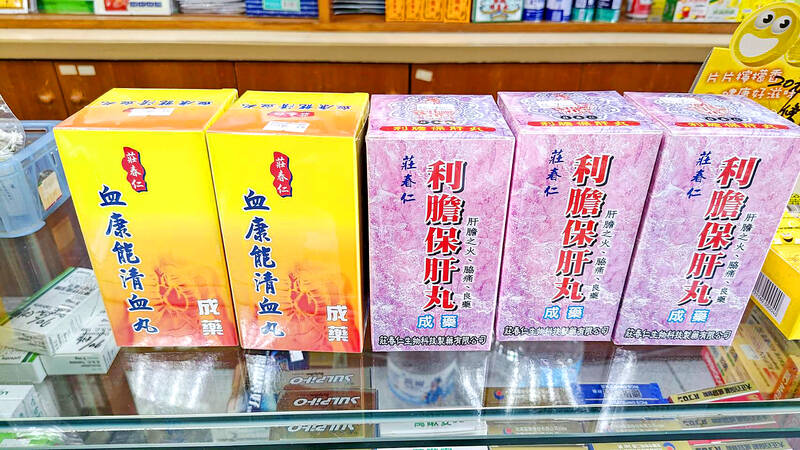The Ministry of Health and Welfare yesterday recalled 12 types of traditional Chinese medicine produced by Tainan-based Juang Chuen Ren Biotechnology Pharmaceutical Co (莊春仁生物科技製藥), while it is being investigated for allegedly manufacturing counterfeit drugs.
The Tainan Public Health Bureau and the Ministry of Justice Investigation Bureau conducted an inspection of Juang Chuen Ren and found that medicine was being manufactured in a food factory, the Department of Chinese Medicine and Pharmacy said in a statement.
The medicine was also found to contain an unknown powder, and the company is suspected of contravening Article 82 of the Pharmaceutical Affairs Act (藥事法), the department said.

Photo courtesy of the Kaohsiung Department of Health
Article 82 covers penalties for those suspected of manufacturing or importing counterfeit or prohibited drugs.
The act stipulates that the penalty for manufacturing counterfeit drugs is up to 10 years in prison or a fine of up to NT$100 million (US$3.1 million), department section chief Shih Hui-chuan (施惠娟) said.
The health ministry has ordered that 12 products be removed from shelves and is recalling all products that have already been sold or are still in stock.
The products being recalled are Juang Chuen Ren Guey Fuh Dih Huang Wan (桂附地黃丸), Ren Tsan Guh Chyuan Pills (人參固泉丸), Lih Daan Bao Gan Wan (利膽保肝丸), Zi Yun Gao (紫雲膏), Hsieh Kang Nen Ching Hsieh Wan (血康能清血丸), Liu Wei Di Huang San (六味地黃散), Chia Wei Huan Shao Wan (加味還少丸), Gardenia powder (梔子散), Scutellaria powder (黃芩散), Jin Suo Gu Jing Wan (金鎖固精丸), Sharen powder (砂仁散) and Ban Long Wan (斑龍丸).
The Tainan District Prosecutors’ Office is looking into which retailers the products were sold at and how many items need to be recalled, Shih said.
People who have purchased the products are advised to stop taking them and seek medical attention if they feel ill after use, she said.
The health ministry said that people who have questions about traditional Chinese medicine products they have purchased or are taking can check the Department of Chinese Medicine and Pharmacy’s product permit inquiry page to see if the drug they are taking has been registered and is legal.
National Union of Chinese Medical Doctors’ Association official Chen Chao-tsung (陳潮宗) said that Juang Chuen Ren’s products are not sold in Chinese medicine clinics, but they are advertised on TV and radio, and are sold over the counter in pharmacies and cosmetics stores.
The standards for food factories and drug factories are not the same, he said.
The production of Chinese medicine must meet Good Manufacturing Practice guidelines, which include regulations on ingredient selection, manufacturing and storage conditions, he said, adding that even if one condition does not meet requirements, it can be considered counterfeit.

People can preregister to receive their NT$10,000 (US$325) cash distributed from the central government on Nov. 5 after President William Lai (賴清德) yesterday signed the Special Budget for Strengthening Economic, Social and National Security Resilience, the Executive Yuan told a news conference last night. The special budget, passed by the Legislative Yuan on Friday last week with a cash handout budget of NT$236 billion, was officially submitted to the Executive Yuan and the Presidential Office yesterday afternoon. People can register through the official Web site at https://10000.gov.tw to have the funds deposited into their bank accounts, withdraw the funds at automated teller

PEACE AND STABILITY: Maintaining the cross-strait ‘status quo’ has long been the government’s position, the Ministry of Foreign Affairs said Taiwan is committed to maintaining the cross-strait “status quo” and seeks no escalation of tensions, the Ministry of Foreign Affairs (MOFA) said yesterday, rebutting a Time magazine opinion piece that described President William Lai (賴清德) as a “reckless leader.” The article, titled “The US Must Beware of Taiwan’s Reckless Leader,” was written by Lyle Goldstein, director of the Asia Program at the Washington-based Defense Priorities think tank. Goldstein wrote that Taiwan is “the world’s most dangerous flashpoint” amid ongoing conflicts in the Middle East and Russia’s invasion of Ukraine. He said that the situation in the Taiwan Strait has become less stable

CONCESSION: A Shin Kong official said that the firm was ‘willing to contribute’ to the nation, as the move would enable Nvidia Crop to build its headquarters in Taiwan Shin Kong Life Insurance Co (新光人壽) yesterday said it would relinquish land-use rights, or known as surface rights, for two plots in Taipei’s Beitou District (北投), paving the way for Nvidia Corp to expand its office footprint in Taiwan. The insurer said it made the decision “in the interest of the nation’s greater good” and would not seek compensation from taxpayers for potential future losses, calling the move a gesture to resolve a months-long impasse among the insurer, the Taipei City Government and the US chip giant. “The decision was made on the condition that the Taipei City Government reimburses the related

FRESH LOOK: A committee would gather expert and public input on the themes and visual motifs that would appear on the notes, the central bank governor said The central bank has launched a comprehensive redesign of New Taiwan dollar banknotes to enhance anti-counterfeiting measures, improve accessibility and align the bills with global sustainability standards, Governor Yang Chin-long (楊金龍) told a meeting of the legislature’s Finance Committee yesterday. The overhaul would affect all five denominations — NT$100, NT$200, NT$500, NT$1,000 and NT$2,000 notes — but not coins, Yang said. It would be the first major update to the banknotes in 24 years, as the current series, introduced in 2001, has remained in circulation amid rapid advances in printing technology and security standards. “Updating the notes is essential to safeguard the integrity